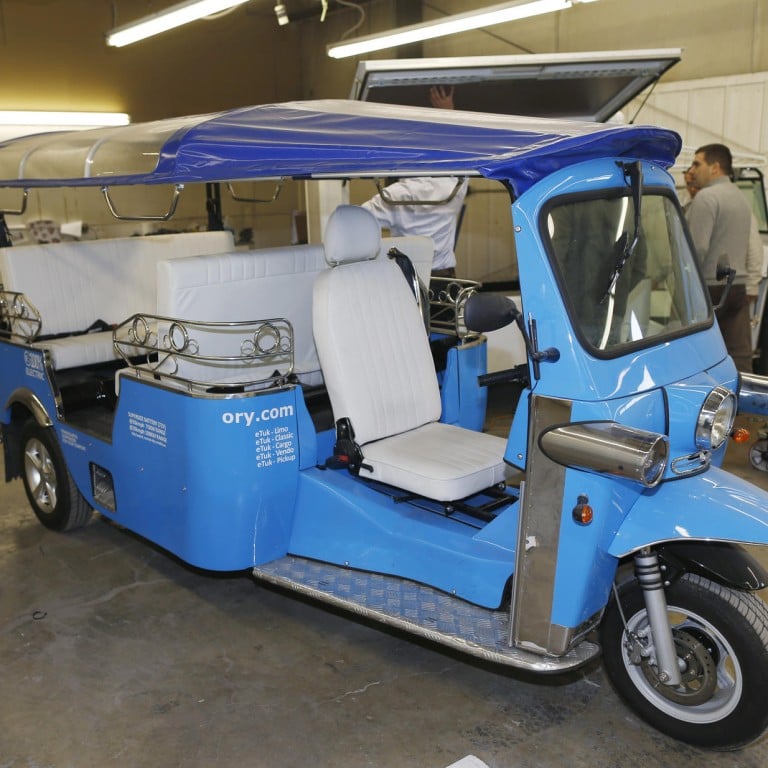
Amsterdam tuk-tuk taxi maker aims to make inroads in United States
Amsterdam manufacturer has signed a deal with Denver company to produce and sell an electric version of three-wheeled rickshaws
They're ubiquitous in Asia, swarming the bustling streets of Bangkok, New Delhi and Beijing.
Now, a company that manufactures tuk-tuks - the three-wheeled motorised rickshaws that have moved the masses for more than a century and go by many other names in Asia, Africa and Latin America - aims to make inroads in the United States.
The Tuk Tuk Factory, based in Amsterdam, has signed a licensing agreement with Denver-based eTuk USA to allow the company to manufacture and sell an electric version of the vehicle. The company's founders hope the eco-friendly vehicles, a far cry from the loud, pollution-spewing versions common in Asia and South America, will become the next hip mode of transportation for urban dwellers and tourists across the country.
It's too soon to know if Americans will embrace tuk-tuks, but Michael Fox, the director of sales and marketing for eTuk USA, says that the company has been selling the vehicles to individuals, marketing companies and food vendors for US$16,950 to US$25,000, depending on how they are customised.
The three partners' other company, eTuk Denver, launched a call-and-demand shuttle service in downtown Denver after receiving approval from the Colorado Public Utilities Commission, which regulates for-hire transportation services in the state.
The service is the latest to enter an increasingly crowded field of transportation options that includes pedicabs, ride-hailing services such as Uber and Lyft and golf-cart taxis.
Fox is banking on the tuk-tuk's open-air design to help it stand out.
"When you look at a golf cart and you look at a tuk-tuk, which has more curb appeal?" he asked.
But like ride-hailing services, the tuk-tuk has faced some pushback from a handful of cab companies and other shuttle operators and raised concerns about the vehicles' safety.
Terry Bote, a commission spokesman, said several cab and shuttle companies were successful in restricting where the tuk-tuks could operate, what types, how many vehicles could be used and how many passengers each could carry.
The tuk-tuks operate mostly in a restricted downtown area and are banned from providing scheduled service to the nearby Broncos' football stadium, a lucrative destination for the competition. But even with the restrictions, Fox said his service could complement Denver's bus and light-rail systems. He noted the "last-mile concept", a term that has been used by urban planners to describe the difficulty of getting the people from a railway station or a bus depot to their final destination.
Because tuk-tuks are classified as motorcycles by the US Department of Transportation, drivers would have had to wear eye protection and get a motorcycle endorsement for the license. Anyone under 18 also would have had to wear a helmet.
But state Representative Paul Rosenthal said such requirements for vehicles that travel short distances at low speeds didn't make sense, especially for a shuttle service.
"Say you have four kids. They would have to go find a helmet or have them on hand to do that," Rosenthal said. "It becomes cumbersome."
On May 4, the Colorado legislature passed Rosenthal's bill to strip those requirements for three-heeled motorcycles with a windshield, seatbelts and a top speed of 40km/h. Each shuttle model also has undergone a standard commercial vehicle inspection to make sure it complies with federal safety standards.
Still, most states heavily regulate three-wheeled vehicles because of what some say is the potential for serious accidents.
Sherry Williams, who chairs a committee of independent researchers on motorcycle safety, said helmets should be required and passengers needed to be aware of the possible danger in the event of an accident, even at slow speeds. "Most motorcycle accidents occur under 30 mph, and many of them are fatal. This is a serious issue," she said.
